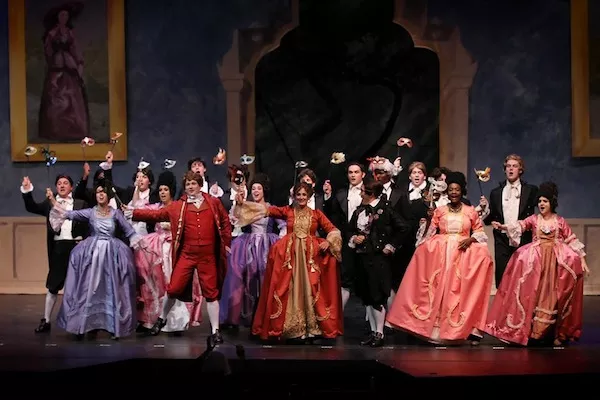When I first saw The Scarlet Pimpernel in the fall of 1997, Broadway ticket prices had already risen to an outrageous $75 and, even more unprecedented, critics had expressed hostility toward Frank Wildhorn's new musical even before it opened. Producers of the show had the audacity to issue a three-song CD sampler free to readers of the New York Times in an attempt to woo their target audience to the Minskoff Theatre. Such impudence, scribes bellyached, had clearly been an attempt to sway public opinion before New York's official arbiters of taste could render their verdicts.

I saw things differently. I wasn't offended, was glad to receive my little sampler, and regarded the Pimpernel producers' actions as a rather traditional, legitimate marketing ploy for a commercial product - though admittedly more lavish than the detergent packets I was accustomed to receiving with my morning newspaper. I also parted ways with most critics when the curtain went up.
For me, Pimpernel had it all - epic scale, swashbuckling action, a sizzling love triangle, and side-splitting comedy. Wildhorn's score crested when the Pimpernel and his gang of English aristocrats set off for France to stem the bloodbath of the French Revolution. The stirring anthem on the promo CD, "Into the Fire," was even more exciting onstage, for a huge boat rose from beneath the stage, lifting the whole marauding band behind its bow as they sailed toward us. Safe to say, this was the most thrilling call to arms and fraternity that I've ever witnessed in a theater.
The saga was far from over. Repenting their hubris toward the critics, producers proceeded to bend over backwards, revising their fabulous show - not once, but twice. Poor Wildhorn and book writer Nan Knighton. The show went on hiatus for nine days before reopening at the Minskoff in the fall of 1998 and rested for another 100 days before transferring to the Neil Simon Theatre late in the summer of 1999. All this drew from the press were hoots of mockery, peaking when "Pimpernel 3.0" re-re-opened.
Sixteen plus years later, I can't tell you which of the three versions of The Scarlet Pimpernel is currently on view at Halton Theater - or if CPCC Summer Theatre's production mashes up all three - but I can say unequivocally that CPCC's version triumphantly vindicates my original A+ enthusiasm. Directing and choreographing, Ron Chisholm seems to have a palpable budget as CPCC celebrates 41 years, and the largesse has been funneled to some design aces. Jennifer O'Kelly has stretched dropcloth after dropcloth across the stage to evoke Sir Percy Blakeney's posh estate, and she's done yeoman's work on the two major appliances, the boat that emerges from the wings and converges at centerstage as well as Madame Guillotine. There may not be 250 of them, but Robert Croghan's costume designs are on a Broadway level in every other respect.
Better than that, Chisholm has assembled the best trio of protagonists I can remember at Halton Theater. Even with weakened tonsils, Tommy Foster delivered nearly all of the Pimpernel's dashing heroism, but in his secret identity as Sir Percy, Foster tends to quietly throw away his most characteristic exclamations, "Sink me!" and "Oh, la!" muting his foppery - and he's initially coy about calling his adversary Shovelin'. No such inhibitions mar Percy's most effeminate outbursts, "The Creation of Man" and "They Seek," the latter with the taunting lyrics of Hungarian Baroness Emma Orczy, who wrote the original 1905 novel - and perhaps invented secret identities as well.
Lucia Stetson makes a seething, agonizing, and seductive heroine as Sir Percy's new bride, Marguerite. Plagued by a chequered past, Marguerite makes a fatal mistake when she gives up the location of a couple of aristocrats to her former paramour Chauvelin. Before he has consummated his marriage, Sir Percy gets damning evidence that Marguerite is a French spy, so he adopts his foppish persona both to deflect suspicion that he is the Pimpernel and to keep himself distanced from his wife. Both husband and wife feel they've been mistaken about the person they've married. Counterbalancing Percy's handkerchief waving antics, the anguish of this mutual distrust is the most moving element of the show, and Stetson combines with Foster to deliver it no less powerfully than the original Broadway production, though I now wish there could be at least one sunny break in Marguerite's string of woeful power ballads.
Like Foster, Beau Stroupe is close to perfection vocally as Chauvelin, steely and Napoleonic in his military outfit. Stroupe's cold, cold presence is what triggers our laughter - and admiration - when Sir Percy trifles with him so audaciously, and his scorn for Percy's effete impotence magnifies Marguerite's shame when the three of them are together. The menace of Chauvelin is best savored when Stroupe has the opportunity to grow amorous and seductive in "Where's the Girl?"
No clipping, screeching, or thumping marred the sound, so kudos to Jeff Murdock taming the wayward Halton soundboard except for a few temporary dropouts during the afternoon. Technical director Don Ketchum probably gets the credit for making the guillotine behave, and ever-reliable Drina Keen directs the music with precision and verve. My only catcalls are for the empty seats at the Sunday matinee. The butts that should have been in them missed a great show.
